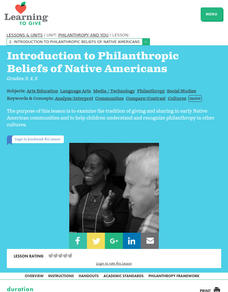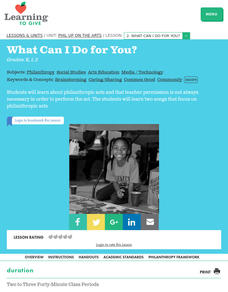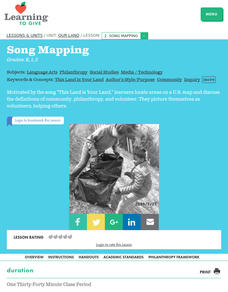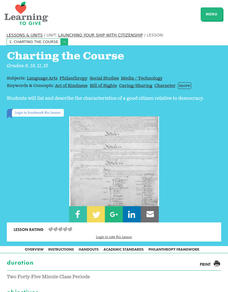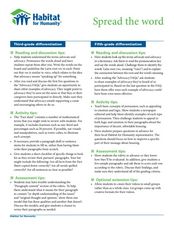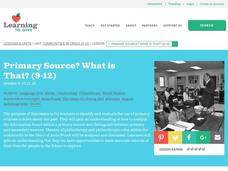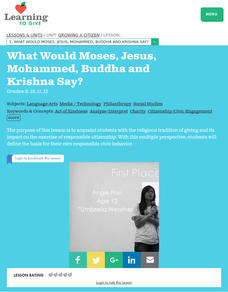Curated OER
Who Needs Friends?
Students discuss how to be a good friend to others. They create a list of characteristics to use in more future lessons. They reflect on they type of friend they are in journal writings.
Curated OER
Jane Addams -- Philanthropist in Action
Students examine the philanthropic actions of Jane Addams and discuss why she is seemed as a role model of being a responsible citizen. They organize different types of volunteer opportunities and create ways to serve the common good in...
Curated OER
Neighbors Helping Neighbors
High schoolers examine the philanthropic acts of Jane Addams. They identify a current problem in their community and develop ways to help. They also examine the work done in the Hull House in Chicago.
Curated OER
Literacy: Each One Teach One
Students read the book, Amber on the Mountain and discuss its philanthropic implications. They determine the literacy needs of their own communities. They ask family members to complete reading recollection forms about when and how they...
Curated OER
Time, Talent, and Treasure
Students identify componets of stewardship and philanthropy. They examine their talents and how they use their time. They develop ways to use their time and talents to help others.
Curated OER
Philanthropy and Native Americans
Students examine the philanthropic traditions of early Native American communities. They use graphic organizers to record information and share their ideas with classmates. They create three-panel comic strips depicting philanthropic...
Curated OER
Closer To the Ground Lesson 1: Sharing the Wealth
Learners examine the meaning of philanthropy. They look at specific needs and determine the process of requesting grants from various foundations. They determine a need within the school community and write a grant application or...
Curated OER
Ethics and Philanthropy The Act of Sharing and Giving
Learners define ethics, and identify ways that they have practiced philanthropy in their own family. They listen to a book, write an essay, and identify a role model for philanthropy.
Curated OER
Phil Up on the Arts
Sstudents examine the concept of community in their classroom and school. They list philanthropic acts they could perform without teacher permission. They also memorize and sing two songs with philanthropic themes.
Curated OER
Our Land Lesson 2: Song Mapping
Students study the meaning of philanthropy as giving of time. talent, and treasures. They sing This Land Is Your Land while locating five of the places on a map of the United States showing that relief office are everywhere. They decide...
Curated OER
Get To Know Your Local Philanthropic Organizations
Students develop appropriate interview questions, interview a philanthropic organization, and present information to the class. They use pamphlets and/or other materials gained during their interviews to mount a display about the local...
Curated OER
Charting the Course
Students list and describe the characteristics of a good citizen relative to democracy. They see that philanthropy is part of good citizenship and exemplify philanthropy through random acts of kindness. Each group will be responsible for...
Curated OER
Evaluation Is Reflection
Students evaluate their learning about philanthropy and the service project by completing a written reflection on their experience. The reflection will not be just a recap but a looking back to identify with "new eyes" those aspects of...
Curated OER
I Am Who We Are
Students explore the concept of philanthropy and identify specific acts of philanthropy that have affected them personally. They plan and carry out acts of philanthropy focusing on giving back to their community.
Curated OER
Spread the Word!
Students review what they have learned about community service, philanthropy, prejudice and racism in previous lessons. They design a lesson or service learning experience that can be given to and implemented by elementary school students.
Curated OER
A Better Way
Students increase awareness of organizations that grew out of necessity and increased social consciousness during the Civil War and Reconstruction. They trace the origins of three organizations founded for the common good. They link...
Curated OER
Primary Source? What is That?
High schoolers examine the use of primary sources. They read and discuss excerpts from the "Diary of Anne Frank," write journal entries, identify examples of altruism from the book, write an essay, and complete a worksheet.
Curated OER
Who Will Benefit if We Give Bulbs What They Need to Grow?
Students identify the elements needed for bulbs to grow. They raise tulips and give them to various members of the community. They identify local philanthropic communities and look for ways they can constructively donate time and give...
Curated OER
What Would Moses, Jesus, Mohammed, Budha and Krishna Say?
Students compare and contrast five different religions and the views that their leaders have in regard to civic responsibility and philanthropy. They choose one of the five leaders and write a letter outlining their perception of that...
Curated OER
Truth, Trash and Treasure
Students examine how people can make a difference in the world. They read and analyze excerpts from a novel, discuss song lyrics, clean up a local park, and write an essay.
Curated OER
Centennial: Servants of the Community
Students investigate the lives of community benefactors, and discuss the need for citizens to give back to their community. They identify ways to perform service within their community.
Curated OER
The Role of Philanthropy in an Ever Changing World: Where Did it all Start? Time-lines of History
Students create timeline to trace the history and development of the selected organization, and compare the history of the selected organization to actual historical events.
Curated OER
Giving Game-Put It on the Card!
Students explore credit cards and how they are used in purchasing goods and services. They participate in a game called the Giving Game.
Curated OER
Giving Game--Planning to Make The World
Middle schoolers, in groups, examine plans to make the world a beter place. They evaluate the plans based on feasibility, practicality, and do-ability by students their own age.







